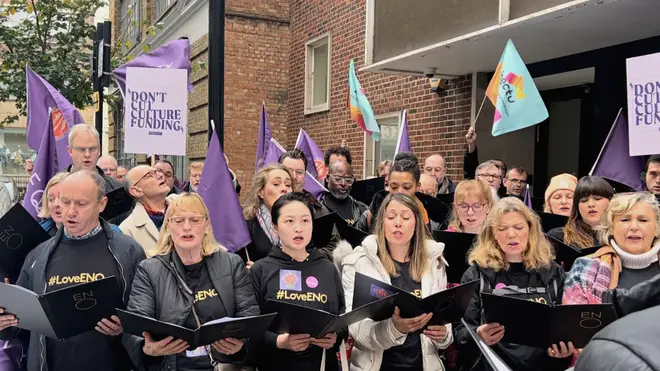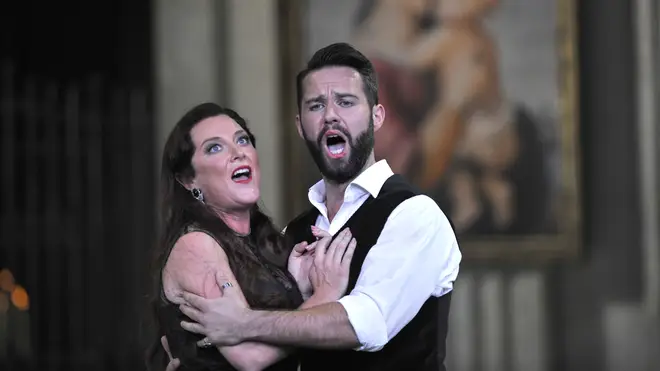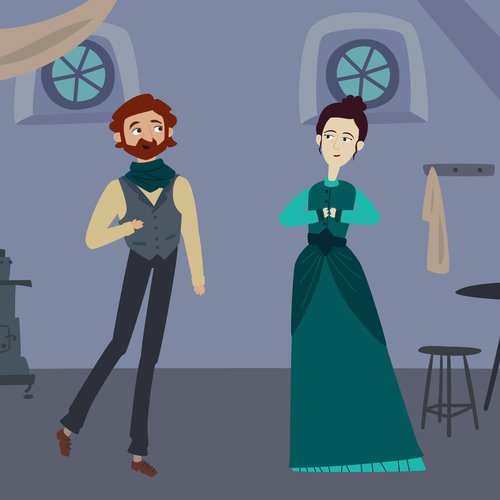ENO chorus sing ‘You’ll Never Walk Alone’ outside Arts Council office as 300 jobs at risk
14 November 2022, 17:55 | Updated: 15 November 2022, 12:05

A crowd of ENO staff and supporters walked from London’s Coliseum to the Arts Council England offices this morning to call for a reversal of the recent national portfolio funding decision.
Listen to this article
Loading audio...
On 4 November, Arts Council England announced that the English National Opera would be removed as a National Portfolio Organisation, subsequently losing its annual £12.6 million funding.
This was instead replaced by a £17 million fund across three years, which could see the opera house move to Manchester.
In response to the funding decision, supporters and employees of the ENO have been vocal across social media and numerous media outlets have reported on the announced cuts.
This morning, Monday 14 November, members of the ENO Chorus along with staff and supporters of the opera house, gathered outside the Arts Council England London office. Led by Chorus Master, Mark Biggins, the singers performed a heartfelt rendition of ‘You’ll Never Walk Alone’ from the Rodgers and Hammerstein musical, Carousel. Watch the video below.
Read more: Leading UK opera companies have funding slashed in Arts Council announcement

Members of the ENO Chorus sing ‘You’ll Never Walk Alone’ outside Arts Council England’s London office
The performance came as part of an event organised by the creative union, Equity. Crowds gathered outside the ACE London office at 11.30am to hear speeches from leaders of three unions including Equity, Musicians’ Union and Bectu. The Independent Society of Musicians (ISM) also joined the event, saying they felt it was especially important “given everything our sector has already been through over the past two years”.
Naomi Pohl, the General Secretary of the Musicians’ Union called the funding cuts an act of “cultural vandalism”, and Equity General Secretary, Paul Fleming, highlighted that since 2005, the arts have sustained “almost half a billion pounds worth of cuts”.
While the crowd listened to their words regarding the impact of the Arts Council’s funding decision, a letter signed by Equity was delivered to the ACE London office by hand and electronically calling on the council to “reverse [their] decision to remove ENO as a National Portfolio Organisation with effect from April 2023”. Another letter from Equity was also hand-delivered to the ACE Manchester office during a similar event, involving staff from Oldham Coliseum, taking place at midday.
Many of the employees at ENO were informed about the cuts via an internal email from ENO CEO, Stuart Murphy, which went round the organisation on the morning of Friday 4 November.

CEO of the English National Opera Stuart Murphy
“The email had news in it that none of us expected,” Rosie Davis, head of stage management at the ENO, told Classic FM.
The ENO employee of 20 years found out the news while running a ‘fly-in’ rehearsal for the opera house’s upcoming production of It’s a Wonderful Life this Christmas.
Davis continued, “I think, as a company, we were braced – as was the whole arts sector – for cuts. But we never expected to receive the news that we received that morning.
“It devastated the workforce. I was on stage and everybody there was distressed and that continued for the rest of the day. It has had a really devastating effect on everybody who works at the ENO”.

It's a Wonderful Life ǀ The Opera ǀ English National Opera
The emotional impact on the cast
The evening the Arts Council cuts were announced, the ENO were due to perform their final show of a 13-night run of Puccini’s Tosca. Biggins told Classic FM, “you can imagine in the pit and onstage, there were just tears from everyone.
“Everyone had this awful realisation that, ‘maybe this is the last time the English National Opera will perform Tosca at the London Coliseum, after all of that amazing history’.”
Looking out at the audience from the stage that night was ENO chorus member, mezzo-soprano Deborah Davison.
“I've been in the chorus for 26 years,” Deborah told Classic FM, “and I still haven't lost that sense of wonder when I look at our beautiful auditorium.
“And the thought that we might not be doing that for much longer, is totally heartbreaking.”
Read more: English National Opera give ‘defiant’ curtain call as opera stars scorn funding cut
#ENO ‘s Tosca was so poignant on the very day the company’s general funding was cut to zero by the arts council. The singers wore their “Choose Opera” t-shirts & the audience wept. Sinead Wallace was truly intoxicating (in-Tosca-acting?) A sad day for the arts in Broken Britain. pic.twitter.com/oEl4OagTvD
— Kathy Lette (@KathyLette) November 5, 2022
Tosca’s final aria, ‘Te Deum’ ends with an emotive swell of a chorus line, and Davis told Classic FM, “I can honestly say that the chorus sang it better that night than I’ve ever heard them sing it. And the orchestra played it more movingly than I’ve ever heard it before.
“I think the reason everyone was so emotional is because at the heart of it, these cuts will dramatically affect 300 people. 300 leading musicians, costume, makeup and technical staff who care passionately about their work, and passionately about the arts. And they could all end up losing their jobs.”
Davison adds, “We’re talking about 300-odd highly skilled people who have built up a company. You can’t just say ‘we’re all going to up sticks elsewhere. We have families, we have lives here.
“It’s not a question of ‘are we going to Manchester of not’. If we do go to Manchester, it won’t be the whole company, and therefore it won’t be the ENO as we know it.”

Why did these cuts happen?
In an article for The Guardian, chief executive of Arts Council England Darren Henley wrote that the funding changes were down to a new generation of audiences.
“I know the ENO decision seems stark,” wrote Henley. “I know nothing can take away the pain of the artists, performers, technical teams and audiences who love the company and its home at the Coliseum. But if we consider the future of opera and classical music more generally, it is clear some things must change.”
According to Henley this new generation is “embracing opera and music theatre presented in new ways: opera in car parks, opera in pubs, opera on your tablet.
“Fresh thinking helps the art form reimagine itself and remain exciting and meaningful to future generations of audiences and artists.”
Notable musical organisations who joined the Arts Council’s national portfolio for the first time in the 2023-26 round included Chineke! Orchestra and Manchester Collective. The orchestras received annual funding of £700,000 and £120,000 respectively, along with Pegasus Opera, which provides opportunities in opera for artists of African and Asian heritage.
2/2 The loyal audience at @E_N_O plays in inestimable part of that development. Their support has meant everything to us including volunteers who help the company along. We must, as a country pull together and convince @ace__london that London IS ENO’s home & always has been.
— Dame Sarah Connolly (@spconnolly) November 6, 2022
Dame Sarah Connolly told Classic FM, “This is a terribly terribly distressing moment for the workers of ENO, and for everybody who loves the ENO.
“Unfortunately, by losing this grant, we can no longer provide the training ground for young artists to grow and become competitors.
“The arts industry is the second biggest industry in the UK, so I do not understand why we're being kicked in the teeth. We need a government who understands just how important our industry is.”
Connolly was made a Dame Commander of the Order of the British Empire (DBE) in the 2017 Birthday Honours for services to music. She has worked with the English National Opera since 1994.
Connolly continued, “My colleagues, my singing colleagues, my musician friends, people associate with the ENO you know, are the best in the world.
“They want the best for everybody, for disabled people, for children, for everybody really. And it is an absolute crisis for British music that just is happening.”




